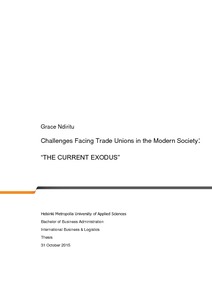Challenges Facing Trade Unions in the Modern Society: “THE CURRENT EXODUS”
Ndiritu, Grace (2015)
Ndiritu, Grace
Metropolia Ammattikorkeakoulu
2015
All rights reserved
Julkaisun pysyvä osoite on
https://urn.fi/URN:NBN:fi:amk-2015112317274
https://urn.fi/URN:NBN:fi:amk-2015112317274
Tiivistelmä
It’s not a secret that trade unions have been experiencing insurmountable challenges related to globalisation. Although the levels of impact differ greatly, the challenges faced by trade unions in Nordic and Western European countries show similarities; high unemployment rates, economic crisis, diverse workforce, escalated immigration, among others. Studies show that trade unions are trying to combat these challenges by adopting organising model elements which involves social unionism movement. Unfortunately, this has not been adopted by all unions.
This study looks at the general challenges faced by trade unions due to globalisation and mainly focus on immigration due to the broadened subject of globalisation and trade unions. Another reason is because of the current increasing asylum seekers in EU countries, particularly in the Nordic and Western European countries. Majority of the latter becomes part of the workforce, after sometime of been registered in the country of destination and are categorised under immigrant workers. Hence, the relationship between trade unions and immigrant workers, and how it can be improved is examined. An extensive secondary research is carried out, to gather information from varying sources about the subject matter.
The findings show that many trade unions are open to have fruitful relationships with immigrant workers and are organising and forming alliances with different immigrant orientated organisations. The success will entirely depend on trade unions’ initiatives.
This study looks at the general challenges faced by trade unions due to globalisation and mainly focus on immigration due to the broadened subject of globalisation and trade unions. Another reason is because of the current increasing asylum seekers in EU countries, particularly in the Nordic and Western European countries. Majority of the latter becomes part of the workforce, after sometime of been registered in the country of destination and are categorised under immigrant workers. Hence, the relationship between trade unions and immigrant workers, and how it can be improved is examined. An extensive secondary research is carried out, to gather information from varying sources about the subject matter.
The findings show that many trade unions are open to have fruitful relationships with immigrant workers and are organising and forming alliances with different immigrant orientated organisations. The success will entirely depend on trade unions’ initiatives.
